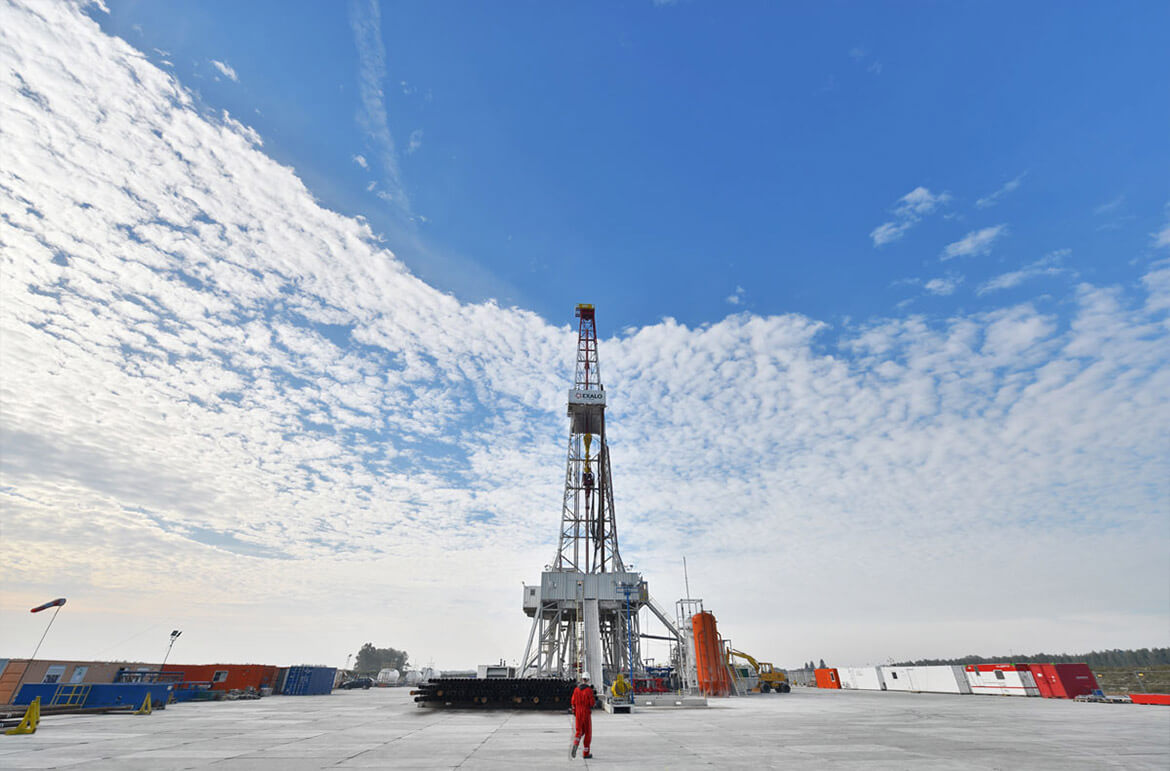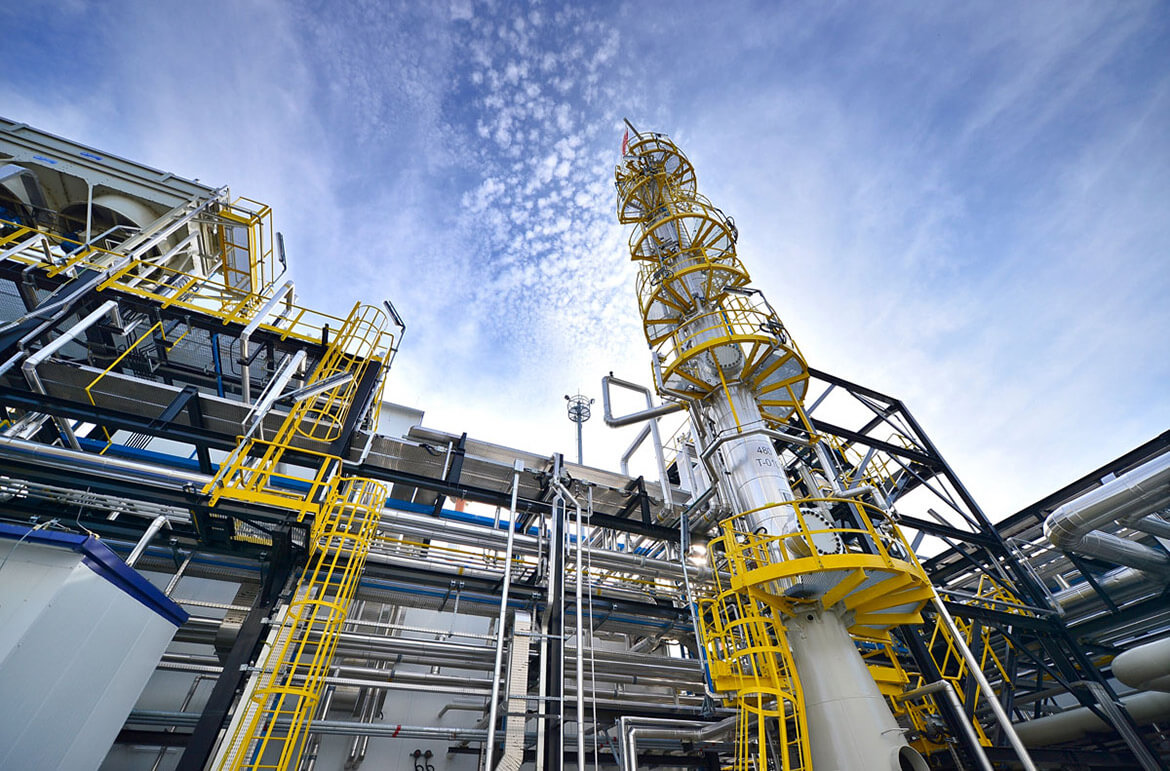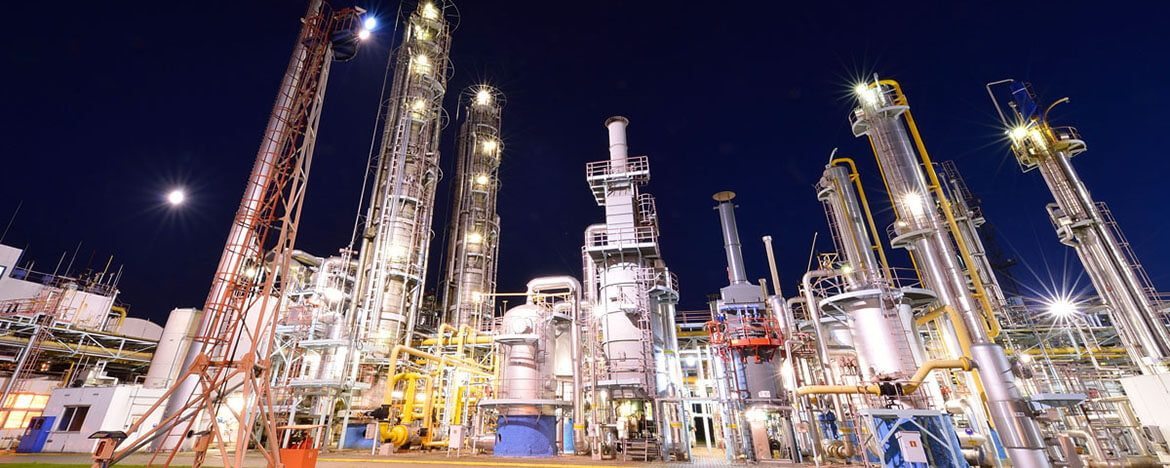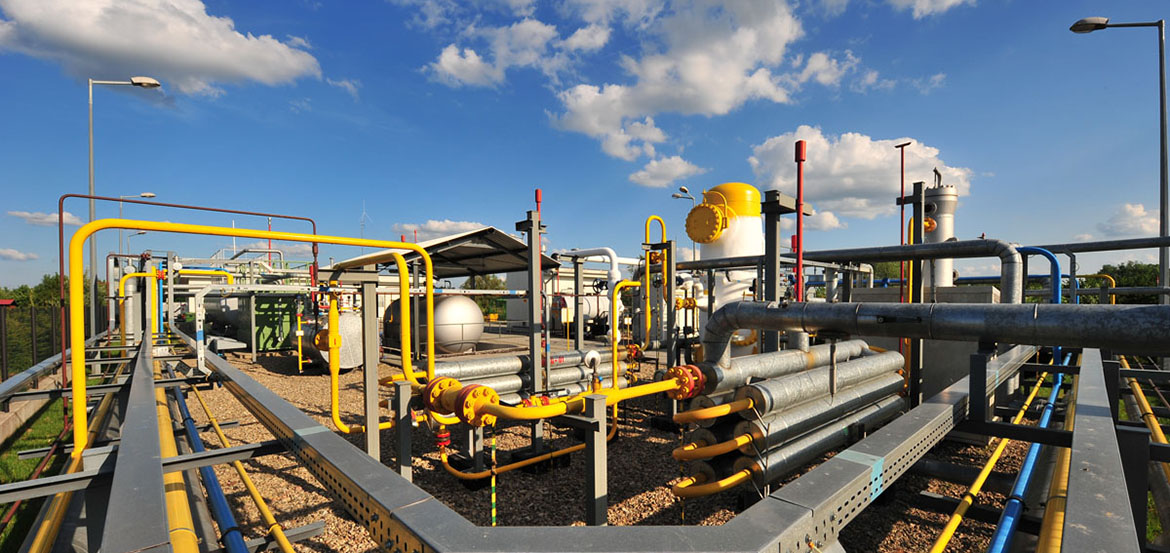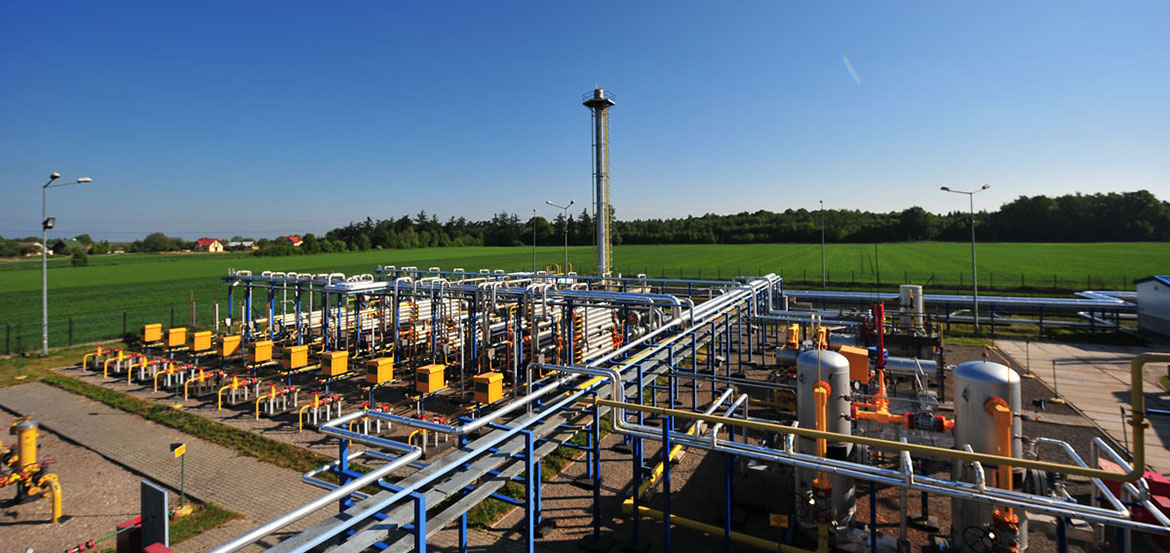The Strategy of the PGNiG Group for 2014-2022 has been developed to address the challenges facing the Group in the coming years.
The new Strategy of the PGNiG Group for 2014-2022 covers four key business areas and 12 strategic initiatives.
Mission statement
By developing oil and gas production and making efficient use of our infrastructure, we provide our Customers with environment-friendly energy, while building the Company’s value for our shareholders and employees.
Vision
Our vision is to grow from a guarantor of gas supplies into a profitable and competitive player on the hydrocarbon production and energy markets.
Primary objective
Our objective is to maintain EBITDA at current levels until 2017, and increase it to ca. PLN 7bn in 2022.
(A) Maintaining a stable value of sales (both in retail and wholesale)
Deregulation in the present form creates a situation in which the PGNiG Group is responsible for Poland’s gas security, ensuring stable gas supplies to customers and handling import contracts, while also being forced to comply with the tariff model, which leads to high losses in the wholesale business, and also meet the requirement to sell a part of its gas volume through the power exchange, which drastically elevates the risk of losing a significant share of the market. Under this gas market deregulation model, the PGNiG Group bears the full cost of the process, which results in losses on its wholesale operations. These losses represent stranded costs and cannot be charged to end users.
The PGNiG Group must immediately take steps to overcome the threats to its operation on the domestic gas market. A failure to resolve the problems associated with long-term import contracts, regasification charges and the consequences of the exchange sale requirement may cripple the PGNiG Group’s financial strength.
Within this area, the PGNiG Group will seek to maintain its leading position on the gas market and remain the preferred gas supplier across all customer segments. The Group intends to pursue these objectives by developing and implementing mechanisms that would encourage customers to continue their relationship with PGNiG, and by transforming its sales model to improve customer service quality. The strategy of the PGNiG Group is to maintain a high stability of gas supplies to end users and to enhance the Group’s product offering through such initiatives as the launch of dual fuel products and the development of additional services. The priority in this area is to develop and implement mechanisms that would mitigate the risk related to the Company’s long-term gas import contracts. The Company will seek to introduce more flexibility into its natural gas portfolio and adjust the portfolio to the changing pricing and supply/trading conditions on the market, while maintaining its ability to ensure the security of supplies expected by customers.
Related initiatives:
(1) Optimising the natural gas portfolio management
-
Liberalising the natural gas portfolio by increasing the flexibility of prices and supply terms, while securing uninterrupted supplies of natural gas.
-
Optimising the portfolio management and trading policies for the liberalised natural gas market.
-
Developing and implementing the final concept for gas procurement after 2022.
-
Reducing the adverse impact of long-term gas supply contracts and of the agreement with the LNG terminal operator concerning the allocation of regasification capacities.
(2) Developing and implementing a new retail and wholesale model
-
High customer satisfaction − qualitative change in the customer service model (building the sales function) and implementing new product offerings.
-
Achieving an operating efficiency at the Retail Trading Company that would allow PGNiG to reduce customer service costs.
-
Minimising the decline of PGNiG’s share in the market’s total volume of gas sales.
-
Creating conditions for the exchange sale requirement to be met.
-
Developing and implementing a foreign operations model.
-
Limiting the negat\\ive impact of the Polish gas market liberalisation on the results of the PGNiG Group.
-
Generating a positive margin on gas wholesale trading.
(B) Maximising cash flows from infrastructure and generation areas
The PGNiG Group’s grid infrastructure, gas storage, and electricity and heat generation assets are a source of predictable, stable revenue and deliver attractive rates of return relative to the risks. In the coming years, the assets will prove important in stabilising the Group’s financial performance and enhancing its ability to finance new projects. The role assigned to the infrastructure and generation area will call for ongoing cost control and the optimisation of capital expenditure. In a time of intense competition, it will be of paramount importance to ensure that this business area generates maximum free cash, particularly for new growth-oriented projects. Furthermore, new investment projects will have to be carefully selected to ensure that the Group’s potential and available synergies offered by new growth areas are fully leveraged. The Group will pursue new, profitable transmission infrastructure projects (heat networks) as one of its development directions.
Given the regulatory risks inherent in the PGNiG Group’s principal business, the implementation of the Group’s strategy requires dialogue with the regulator, decision-makers, representatives of the industry, and key stakeholders in the Company’s environment to minimise the negative impact of legislative solutions on the Group’s operations.
Related initiatives:
(3A) Maximising value from transmission infrastructure – gas distribution
-
Maximising profitability with WACC at a level agreed for distribution operations by the President of the Energy Regulatory Office (URE).
-
Increasing the volume of transported gas through development projects and new connections.
(3B) Maximising value from transmission infrastructure – heat distribution
-
Seeking additional value growth in new segments − long-term increase in cash flows through effective investments in new network infrastructure projects (heat distribution).
-
Reaching synergies in the network distribution area.
(4) Taking an active part in creating energy market regulations
-
Preparing a detailed programme to support changes in the regulatory environment aimed at improving the profitability of the fuel and energy industry and gas distribution sector, in particular through supporting highly-efficient natural gas based cogeneration, storage, distribution, as well as the exploration and production segment.
-
Developing suggestions for regulatory alternatives to mitigate risks arising in connection with long-term contracts and statutory obligations.
-
Preparing suggestions for regulatory changes that would be favourable for the development of new segments (CNG, LNG).
(C) Strengthening and transforming the exploration and production area
The development of the PGNiG Group should leverage its key competitive advantages and focus on the most prospective area of its operations. The competence and experience gained by the PGNiG Group in hydrocarbon exploration and production, and the increasing importance of access to a diversified portfolio of hydrocarbon deposits for fuel and energy companies to remain profitable, make the upstream segment the key driver of the Group’s further growth. However, if the confirmation of geological and economic potential of shale gas deposits in Poland will not result in a revolution on the hoped for scale, building a sustainable and profitable portfolio of production assets will require the PGNiG Group to pursue more exploration projects outside of Poland (also covering unconventional deposits).
A reasonable evaluation of the potential of domestic conventional deposits does not promise any discoveries that would markedly increase the PGNiG Group’s reserves in Poland and allow the Group to further expand production from domestic fields. The Group may only aspire to maintain its current levels of production. In order to be able to fully utilise our capabilities, which are unmatched by any competitors in Poland, and to ensure meaningful growth of the Company’s value, we must take active steps to consistently build a portfolio of foreign exploration and production assets.
PGNiG’s main objective is to maintain stable production of natural gas and crude oil in Poland. However, to secure further meaningful growth of shareholder value, the Company intends to take active steps to build a portfolio of foreign exploration and production assets.
The Company will also continue its efforts to confirm the geological and economic potential of shale gas deposits in Poland, within its most promising licence areas, with a view to verifying recoverable unconventional reserves and commencing economically-viable production of hydrocarbons in the shortest possible time.
Related initiatives:
(5) Maintaining the current volumes of domestic production from conventional deposits
-
Maintaining production levels from the existing licence areas by implementing an enhanced recovery programme.
-
Implementing best production practices using a benchmarking system.
-
Improving the capital efficiency of reserves development.
-
Accelerating the development of hydrocarbon reserves in Poland − shortening the duration of development projects.
-
Confirming the potential and economic viability of production from domestic conventional hydrocarbon reserves.
(6) Confirming the geological and economic potential of shale gas deposits in Poland
-
Appraising shale gas reserves.
-
Finding external partners to jointly explore for shale gas.
-
Verifying the economic viability of production in Poland.
-
Pursuing the commercial production of unconventional hydrocarbons.
(7) Expanding the upstream business outside of Poland
-
Developing competence to build and manage the target portfolio of foreign projects with varied characteristics (risk, completion stage) in the exploration and production segment.
-
Building the value of exploration and production segment in line with the adopted strategic objectives by pursuing new projects abroad.
-
Developing and implementing a model for building and managing the target portfolio of foreign projects.
(D) Laying foundations for growth along the value chain
The market deregulation, growing competitive pressures and the development of new business areas (international upstream, unconventional hydrocarbons and infrastructure) require the PGNiG Group to radically change its cost structure and focus on segments vital to its future. The PGNiG Group should improve its capacity to finance new investment projects and its liquidity, while sharpening its competitive edge based on increased operational efficiency.
The PGNiG Group’s staff must be perfectly prepared for changes in the Group’s environment.
To be able to face the challenges ahead, the PGNiG Group needs to build an efficient team of change promoters, to acquire and develop key competencies, and to make a great effort to engage the entire organisation in building a new project-based organisational culture fostering the effective management of resources.
To fully leverage Poland’s energy and resource potential, the PGNiG Group will have to optimally apply technology innovations developed in Poland or elsewhere in the world. Executing new, prospective projects may reposition our business so we can become a company whose competitive edge is based both on expertise and cost advantage.
To ensure further growth, the Group will take steps to improve its cost effectiveness and organisational efficiency at each stage of the value chain. These steps will include cost rationalisation at the PGNiG Group, necessary in light of market deregulation and growing competitive pressures, and the development of new operations (upstream and infrastructure). The Group will also focus on segments of key importance to its future. These measures will improve the Group’s ability to finance new projects and enhance its competitive position on the market.
To ensure the effective implementation of strategic initiatives, an efficient team of change leaders will be established, and the entire organisation will have to be engaged in creating a new objective-, efficiency- and project-oriented organisational culture.
Moreover, PGNiG is looking to assume a structured approach to R&D and innovation management, to obtain financing for its R&D projects from EU funds, and to optimise its portfolio of innovative projects.
Related initiatives:
(8A) Efficiency Improvement Programme
-
Improving operational efficiency throughout the Group.
-
Achieving sustainable savings in operating expenses.
-
Improving the effectiveness of capex spending in all segments of the PGNiG Group’s business..
(8B) Sale of non-core assets
-
Reducing the PGNiG Group’s exposure to non-core assets and equity investments yielding rates of return below WACC.
(9) Creating an organisation based on efficient human resource management, focused on objectives and resource acquisition
-
Building teams, organisation and culture to support the implementation of the PGNiG Group’s strategic objectives.
-
Developing and implementing competency models for key areas of the Group’s business, to identify and eliminate any differences between competencies required and possessed by the organisation.
-
Supporting staff development in areas intended to close competency gaps and implementing a talent development programme.
-
Implementing the organisation’s knowledge management system.
(10) Stepping up R&D activities and searching for innovative areas of growth
-
Creating competitive advantages and fully leveraging the potential of PGNiG’s business model by improving technological efficiency in the hydrocarbon exploration and production area.
-
Enhancing the PGNiG Group’s development potential through increased innovation.
-
Creating conditions for the continued development of the PGNiG Group based on promising commercial technologies in areas closely related to the Group’s business profile.
-
Efficiently acquiring EU funds supporting innovation and R&D activities.
Key strategic objectives
-
Stabilisation of EBITDA at approximately PLN 7bn in 2022.
-
Increase in average annual capital expenditure on organic growth and acquisitions by approximately 20% relative to 2008-2013.
-
Hydrocarbon production in Poland maintained at current levels, i.e. approximately 33 million boe per year.
-
Increase in total crude oil and gas production volume (in Poland and abroad) to approximately 50-55 million boe in 2022 through the acquisition of exploration and production assets.
-
Development of new business areas by expanding the value chain in the distribution segment through the addition of heat assets.
-
Significant enhancement of the PGNiG Group’s operational efficiency (savings of approximately PLN 800m).
The Efficiency Improvement Programme comprises 18 initiatives.
The initiatives are implemented in three streams:
-
Stream A – Initiatives dedicated to individual business segments within the PGNiG Group.
-
Stream B – Cross-cutting initiatives related to all business segments of the PGNiG Group.
-
Stream C – Initiatives related to mechanisms for expenditure allocation within the PGNiG Group.
Expected total savings generated by the Efficiency Improvement Programme:
-
approximately 15%-20% of the identified 2013 cost base.
-
up to approximately PLN 700m-800m of repeatable effects on EBITDA as of the end of 2018.
New strategic areas
Our investments in heating assets offer many benefits to the Group, but also to prospective sellers. The PGNiG Group has a long track record of managing assets on regulated markets, where investments offer stable returns and have a known risk profile. Nearly 70% of heating systems are still held by local governments, but municipal heating assets often require investments exceeding their owners’ financial capacities. As an industry investor, PGNiG will be able to commit to investment projects aimed at replacing dilapidated heating systems and ensuring their compliance with strict environmental requirements. PGNiG is a recognisable and respected Polish investor, with a nationwide presence and long-standing experience of working with local authorities. Furthermore, PGNiG will be able to leverage the synergies and capabilities of the entire Group, including PSG and PGNiG TERMIKA.
Strategic approach to sustainable development and responsible business at the PGNiG Group
The PGNiG Group’s companies conduct their business not only with the economic outcome in mind, but also with care for the process of achieving their objectives, taking into account the expectations and needs of stakeholders. That is why a comprehensive strategy of sustainable development and responsible business was implemented in 2009. It was formulated with active contribution from employees of all areas of the PGNiG Head Office and the PGNiG Group’s companies. Ever since then, we have published CSR reports and been included in the WSE’s Respect Index of socially responsible companies.
The Corporate Social Responsibility Strategy of the PGNiG Group, which harmoniously combines ethical and environmental aspects with business efficiency, is a blend of best practices in that area. By pursuing its sustainable development and responsible business strategy, PGNiG also fulfils its commitments resulting from membership in Global Compact, the UN’s international initiative. We are also an active member of the Responsible Business Forum.
